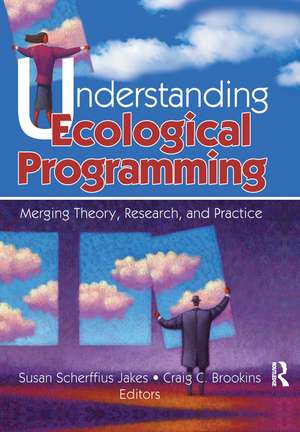Understanding Ecological Programming: Merging Theory, Research, and Practice
Autor Susan Scherffiu Jakes, Craig Brookinsen Limba Engleză Hardback – 12 iul 2004
Understanding Ecological Programming: Merging Theory, Research, and Practice contains vital information to help you become a better community-based program designer using ecological programming. Focused on the basic concept of the ecological programming model—that people’s behaviors cannot be separated from their settings—this book provides examples that clarify how ecological applications in programs increase their effectiveness. With tables, figures, assessment tools, and studies of programs currently using ecological or similar approaches, this book will show you how to change the individual’s environment to prevent further ruinous behavior.
This book will help you find the answers to such questions as:
- what is an ecological social program?
- what are the components of ecological programming?
- what do real programs that have implemented these principles look like?
- how realistic is it to suggest that one should implement an ecological program, is it harder than it seems?
- what are the outcomes of programming with an ecological model?
- what is the cost/benefit ratio of an ecological approach?
Using the information in this book, you can improve on pre-existing social programs and create better ones. Understanding Ecological Programming is a must-read for social program developers/designers, program operators, interventionists, extension agents, community psychologists, human service providers, and extension specialists.
Preț: 574.67 lei
Preț vechi: 766.72 lei
-25% Nou
Puncte Express: 862
Preț estimativ în valută:
109.96€ • 115.10$ • 91.52£
109.96€ • 115.10$ • 91.52£
Comandă specială
Livrare economică 11-25 martie
Doresc să fiu notificat când acest titlu va fi disponibil:
Se trimite...
Preluare comenzi: 021 569.72.76
Specificații
ISBN-13: 9780789024589
ISBN-10: 0789024586
Pagini: 93
Dimensiuni: 148 x 210 x 14 mm
Greutate: 0.75 kg
Ediția:1
Editura: CRC Press
Colecția CRC Press
ISBN-10: 0789024586
Pagini: 93
Dimensiuni: 148 x 210 x 14 mm
Greutate: 0.75 kg
Ediția:1
Editura: CRC Press
Colecția CRC Press
Public țintă
ProfessionalCuprins
- Introduction: Understanding Ecological Programming: Merging Theory, Research, and Practice (Susan Scherffius Jakes and Craig C. Brookins)
- Understanding Ecological Programming: Evaluating Program Structure Through a Comprehensive Assessment Tool (Susan Scherffius Jakes)
- The Adolescent Diversion Project: 25 Years of Research on an Ecological Model of Intervention (Emilie Phillips Smith, Angela M. Wolf, Dan M. Cantillon, Oseela Thomas, and William S. Davidson)
- A Multidimensional Ecological Examination of a Youth Development Program for Military Dependent Youth (Daniel F. Perkins and Lynne M. Borden)
- Cultivating Capacity: Outcomes of a Statewide Support System for Prevention Coalitions (Roger E. Mitchell, Brenda Stone-Wiggins, John F. Stevenson, and Paul Florin)
- Index
- Reference Notes Included
Notă biografică
Susan Scherffiu Jakes, Craig Brookins
Descriere
Understanding Ecological Programming: Merging Theory, Research, and Practice contains vital information to help you become a better community-based program designer using ecological programming. Focused on the basic concept of the ecological programming model—that people's behaviors cannot be separated from their settings—this book provides examples that clarify how ecological applications in programs increase their effectiveness. With tables, figures, assessment tools, and studies of programs currently using ecological or similar approaches, this book will show you how to change the individual's environment to prevent further ruinous behavior.
